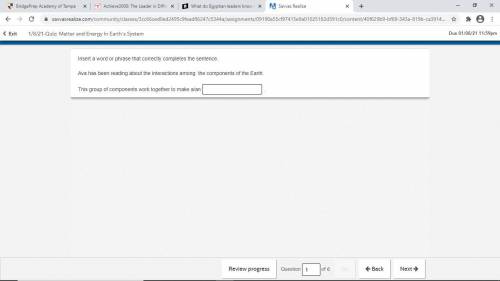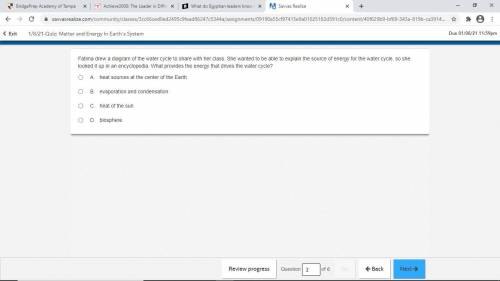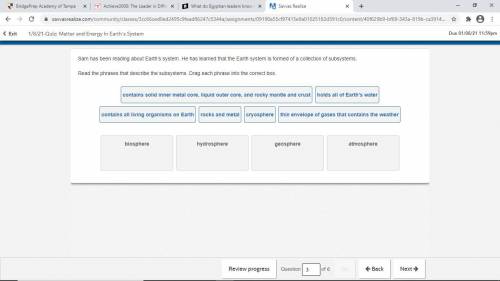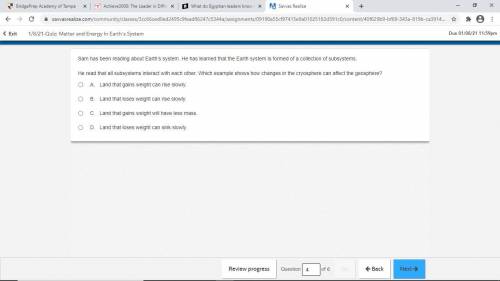
Chemistry, 08.01.2021 21:30 ceeejay0621
Marcus read that systems provide feedback, or the return of information. Feedback can either cause a change in the system or keep it stable. Melting glaciers are an example of positive feedback. Why is this considered positive feedback?
A. Melting glaciers would add more water to the hydrosphere, making it wetter.
B. Melting glaciers would change the land around it, speeding up erosion.
C. Melting glaciers would let the uncovered air and land warm, which speeds up the melting.
D. Melting glaciers would mean more ice at its top, which would slow the glaciers melting.





Answers: 3


Another question on Chemistry

Chemistry, 21.06.2019 21:10
How is 0.00235 expressed in proper scientific notation? a. 2.35 × 10-3 b. 0.235 × 10-2 c. 2.35 d. 2.35 × 103
Answers: 1

Chemistry, 22.06.2019 01:30
Pls! plant cells and animal cells were observed under a microscope. the characteristics of two cells are listed below. cell p: does not capture sunlight cell q: has cytoplasm but no chloroplast which statement about the two cells is correct? cell q also has a cell wall. cell q also has large vacuole. cell p also has a large vacuole. cell p also has a cell membrane.
Answers: 1

Chemistry, 22.06.2019 12:30
Consider the four elements above. which one of these elements will combine with oxygen in a 1: 1 ratio?
Answers: 3

Chemistry, 22.06.2019 17:30
98 points you will be galileo perform the experiment to determine if objects with different mass fall at the same, or different, rates in the air and in a vacuum. before you conduct your experiment, you need to form a hypothesis. a hypothesis is a prediction of what you think will happen in the experiment. the hypothesis is a statement that describes “if” a certain set of circumstances are present “then” there will be a specific result that will occur. record your hypothesis here: record the results from step one of the experiment (dropping the objects in the air): first trial: second trial: third trial: record the results from step two of the experiment (dropping the objects in a vacuum): first trial: second trial: third trial: did the experiment support your hypothesis? using the data from your experiment, describe why you believe your hypothesis was either proven or disproven. what forces were acting on the objects dropped in the air? what force was acting on the objects dropped in the vacuum? part two: comparing forces choose two forces and compare and contrast these forces. you must provide two ways that they are alike and two ways that they are different. you may make a list, write in paragraph form, or make a chart. choose two forces and compare and contrast these forces. these must be different forces than used in the prior question. provide two ways that they are similar and two ways that they are different. you may make a list, write it out, or make a chart.
Answers: 3
You know the right answer?
Marcus read that systems provide feedback, or the return of information. Feedback can either cause a...
Questions


Chemistry, 05.05.2021 21:50


Mathematics, 05.05.2021 21:50

Chemistry, 05.05.2021 21:50

Mathematics, 05.05.2021 21:50

Mathematics, 05.05.2021 21:50

English, 05.05.2021 21:50

Mathematics, 05.05.2021 21:50



Spanish, 05.05.2021 21:50

Mathematics, 05.05.2021 21:50

Advanced Placement (AP), 05.05.2021 21:50

Mathematics, 05.05.2021 21:50

Arts, 05.05.2021 21:50



Mathematics, 05.05.2021 21:50

Chemistry, 05.05.2021 21:50



